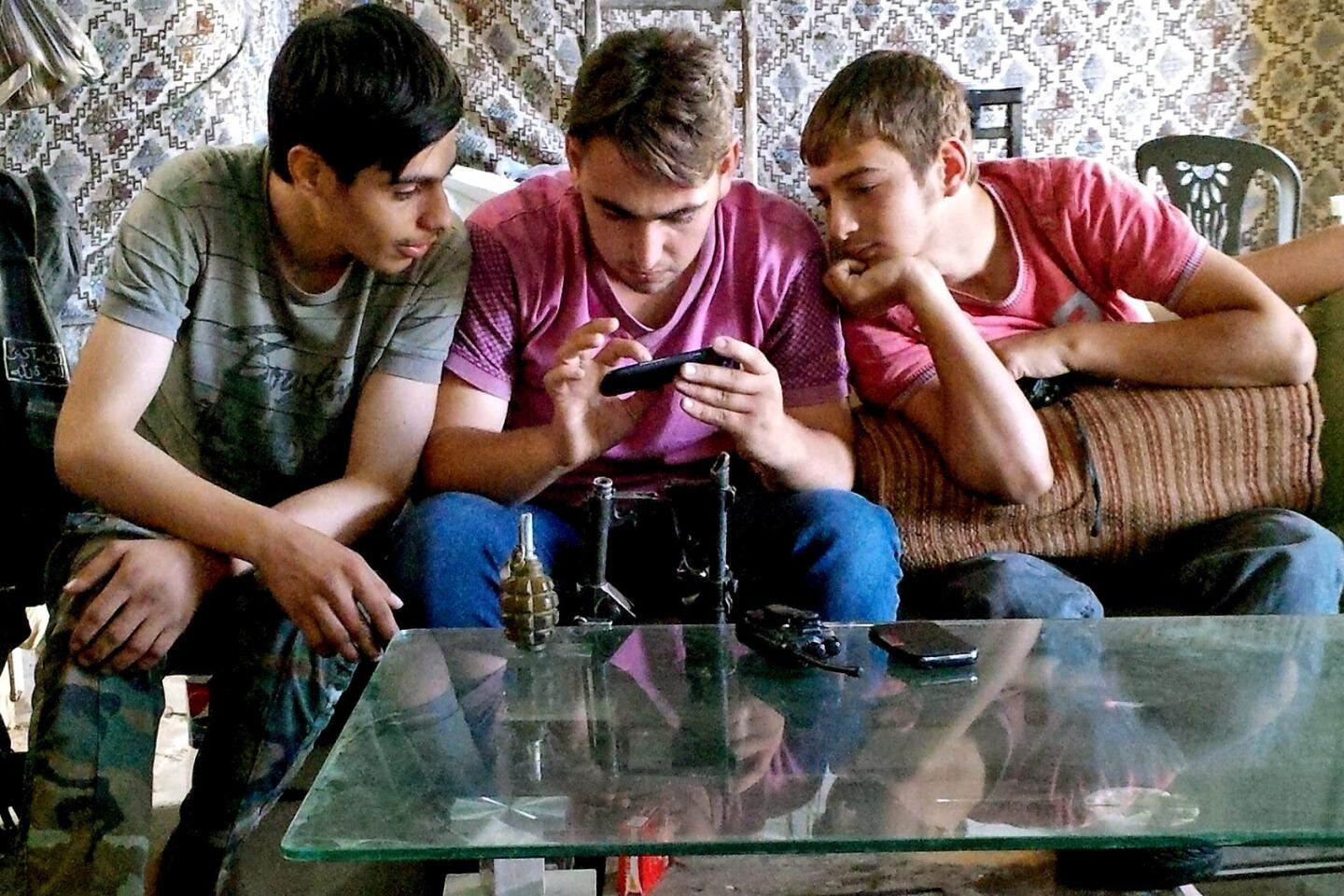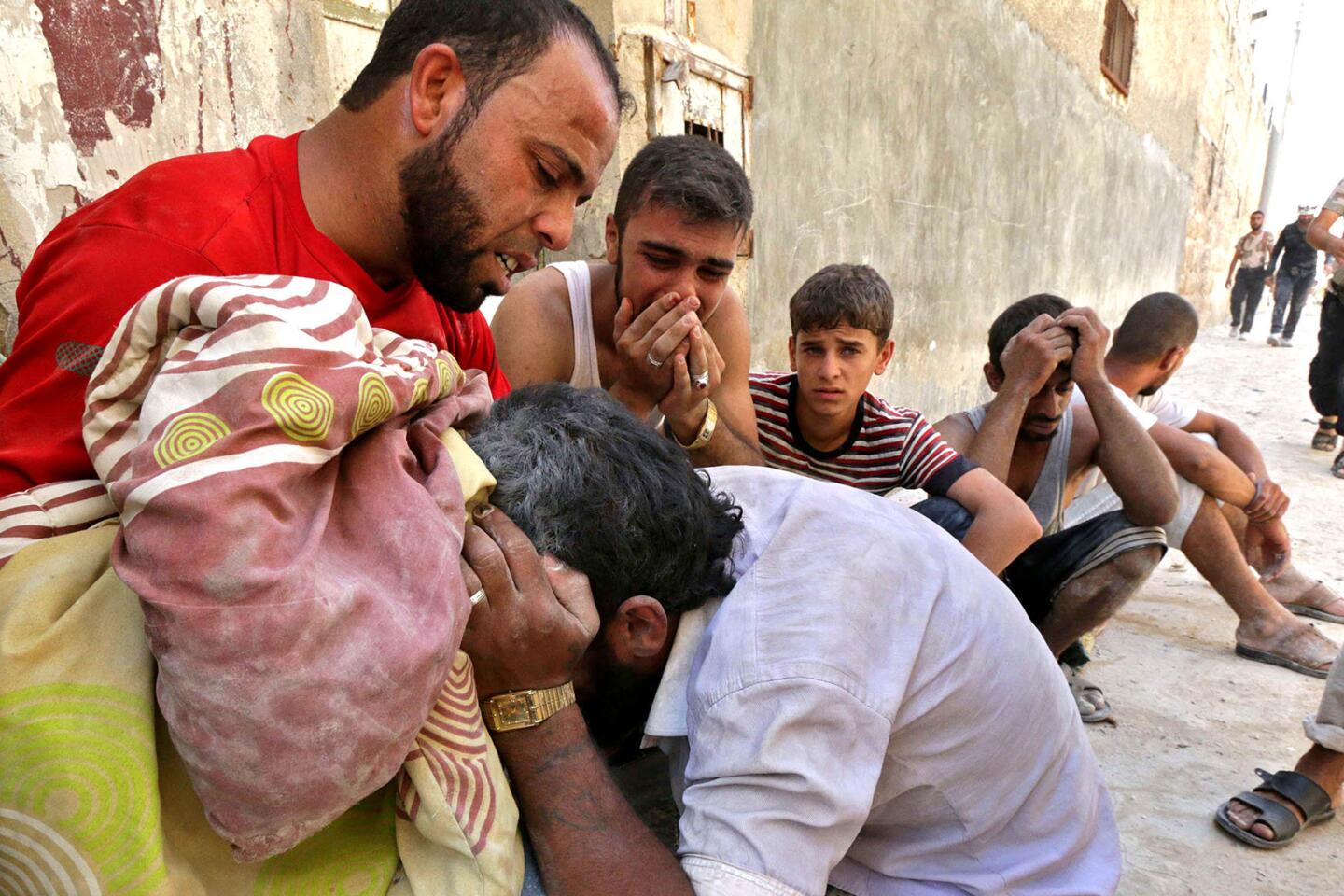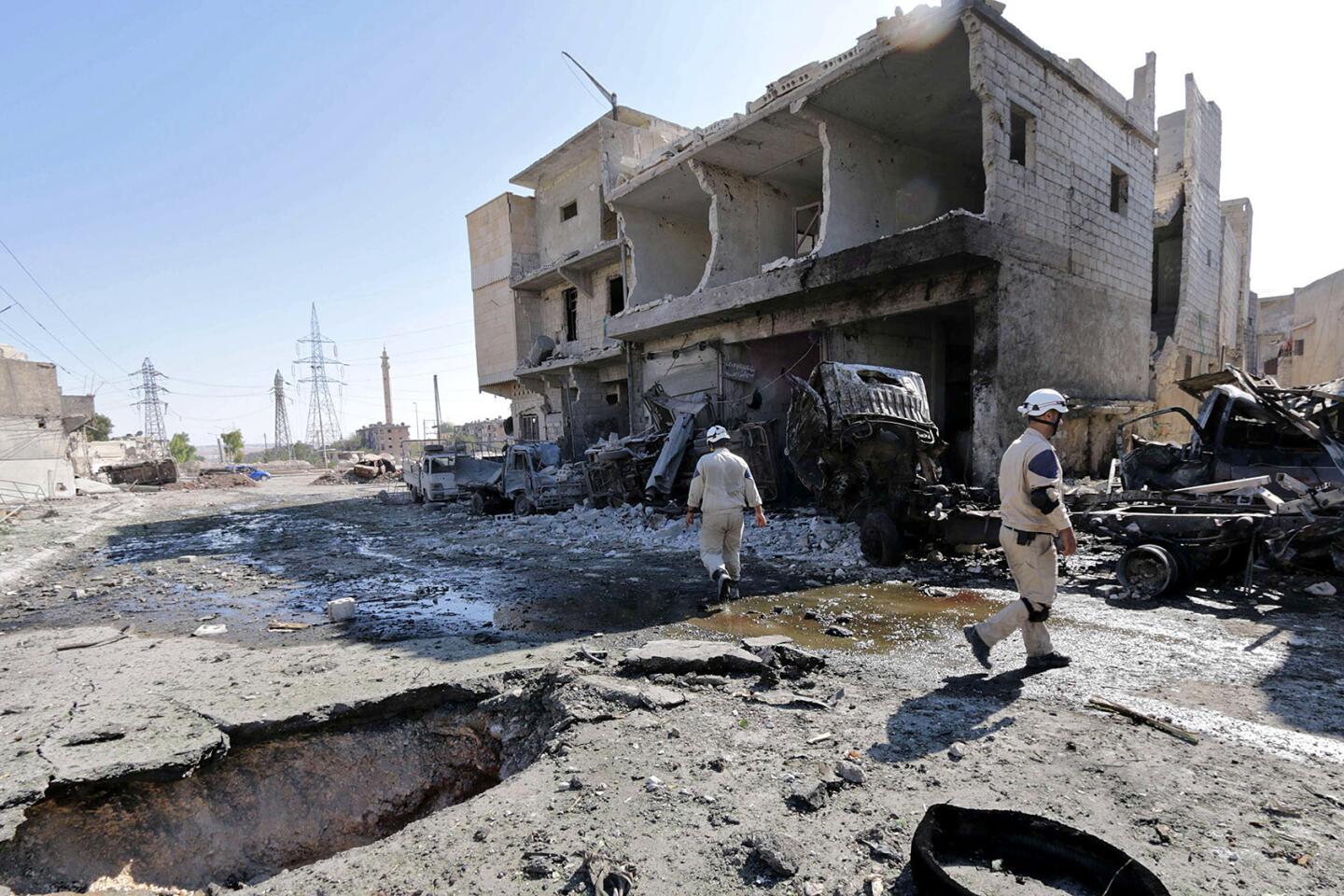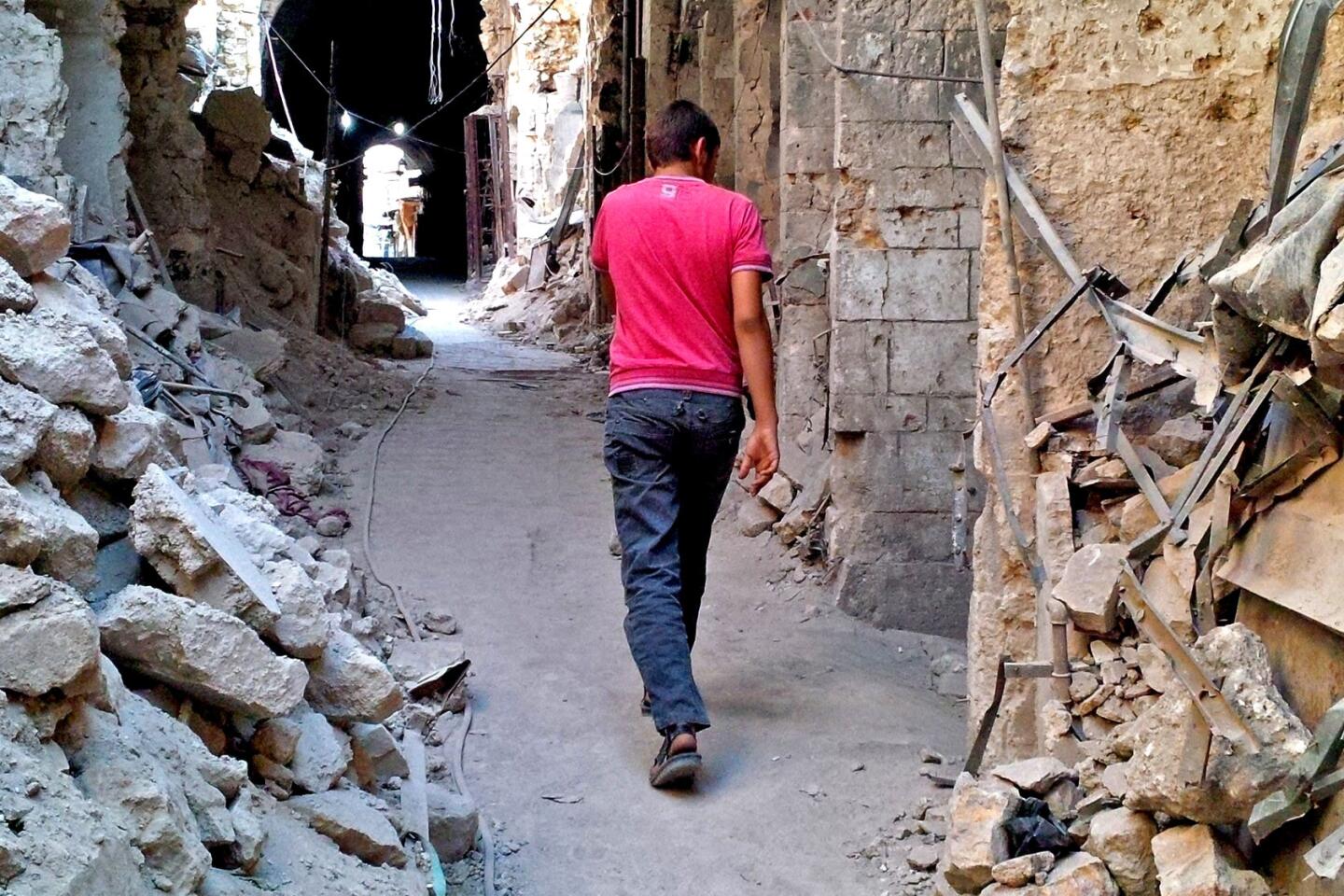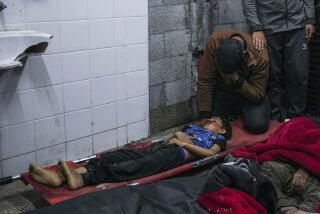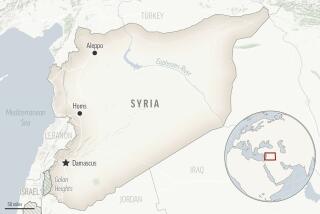Great Read: More and more children join Syrian rebels’ desperate ranks
The prayer room in the 12th century mosque had the feel of a bachelor pad — cups of tea and coffee and half-full ashtrays covered most surfaces. A lanky teenager named Hussein Mansour plopped himself down and placed a grenade and a small bag of pretzels on the table.
He picked up the grenade again and pretended to pull the ring, looking around for a reaction. A fellow rebel fighter, Abu Musab, paused from sucking on a hookah pipe and gave the 16-year-old a disapproving look.
“I mean, he’s carrying a grenade and a 3-cent bag of chips,” he said, shaking his head. “It doesn’t fit. He’s too young.”
Hussein plunked down a can of iced coffee on the table and looked over at Abu Musab expectantly, as if to tip the opinion scale with a caffeinated drink.
As hundreds of fatigued rebel fighters desert the ranks of the opposition and many others are killed daily in battles in the Syrian civil war, their positions are increasingly filled by teenagers like Hussein, a boy with an easy grin and light peach fuzz spread along his chin.
Thirteen of his uncles and cousins have been killed fighting government forces. Now Hussein, whose father was one of the founders of Al Tawheed Brigade, carries the Kalashnikov used by one of his late cousins. He picks it up often, taking it apart and reassembling it, as if playing with a new toy.
Hussein took a break from fiddling with the rifle and motioned to the gun rack beside him. “What do you think these are, antiaircraft weapons? These are just rifles my 6-year-old brother could shoot.”
::
In a war that has already claimed more than 190,000 lives and each day brings new civilian casualties, boys like Hussein are resigned to a morbid fate one way or another. Most seem to live by the ominous creed often heard in rebel areas: “It’s all one death.”
The Syrian Network for Human Rights estimates there are about 5,300 child fighters among the opposition, not including extremist groups such as Al Qaeda-linked Al Nusra Front or Islamic State, and 2,000 with pro-government forces, most between the ages of 14 and 17.
In June, Human Rights Watch released a report on the use of child soldiers, accusing Syrian armed groups of violating international law by enlisting vulnerable children whose families have been killed.
Al Nusra Front and Islamic State have enlisted children through free schooling campaigns that include weapons training and even recruited them to become suicide bombers, according to Human Rights Watch.
Many worry that as teenagers increasingly join the front lines, violence will become institutionalized in Syrian society to a degree beyond what more than three years of civil war has wrought.
“The horrors of Syria’s armed conflict are only made worse by throwing children into the front lines,” said Priyanka Motaparthy, a Human Rights Watch researcher and report author.
Mainstream rebel groups such as the Western-backed Free Syrian Army and the Islamic Front have policies that prohibit enlisting fighters younger than 18. But in reality the situation is one of such desperation that no willing fighter is turned away.
Hassan Suwaas is stationed on the same front line as his 14-year-old son, Omar.
Suwaas, who fights with the Islamic Front, reasoned that it was better than having his son join one of the extremist Islamist groups.
“The kid that grows up and sees a shell fall on him or on his neighbor,” he said, “is going to grow up and want to fight.”
::
The stone walls and pillars of the prayer-room-turned-headquarters at the Umayyad Mosque — gutted and marred by months of clashes — are hidden under tarps and thick carpets, the festive red and gold threads now dulled by dust.
A corner of the room is separated by an Islamic Front flag for sleep and prayers. Nearby sits an Orange Crush refrigerated display case, which was dragged in and set up next to a small coffee and tea stand, which seems to take up the bulk of the young rebels’ duties.
Here at the Umayyad front line, there are only sparse clashes; the line between rebels and government forces hasn’t changed for more than a year. Government soldiers stationed at the centuries-old citadel a few hundred feet away last tried to storm the mosque more than six months ago.
All the fighters are dressed in civilian clothes and most are in flip-flops, since they expect to spend their days lounging on worn and deflated sofas. They rotate four-hour shifts of watching 10 security TVs that monitor the perimeter of the mosque.
As others around him chatted and smoked, 16-year-old Majid, in jeans a few sizes too small that ended inches above his ankles, stared at the TVs as if engrossed in a plotless and character-less show featuring little more than rubble, destroyed antiquities and an overturned tank.
His father, who is stationed at another battle line in the city, was reluctant to allow his son to join the rebels. Only when his father’s friend, a commander in Aleppo’s Old City, pleaded on Majid’s behalf did he relent. His mother still does not approve.
“I lied to her and told her that there are no [government] soldiers nearby,” Majid said. “She thinks I’m far away from the front line.”
Majid had just finished seventh grade when his school, near the citadel, was shuttered as the fighting took hold in the city. With his skinny arms folded across his chest, he insisted he would finish his education when the war was over.
Aamir Mansour, five years older and twice his size, turned to Majid, “Why, you think you’re going to live?”
“No,” Majid said quietly, knowing that was the answer expected.
::
At night, 14-year-old Omar Suwaas sat at the open window of the prayer room listening to bits of chatter from government soldiers over the walkie-talkie in his hands. Still too shy to speak loudly, he would periodically relay the news to his father sitting nearby, who then passed on the information to the headquarters commander.
Omar is a miniature version of his father, with a chubby build, oval face and sweet demeanor.
“There is nothing more valuable than the child,” said his father, a textile merchant. “But we have to do this because what we are witnessing is worse than putting our children on the front line.”
When shelling intensifies or brief clashes break out, Suwaas said, he sends his son home along with the other young fighters.
Omar’s mother, Mahasin, initially objected to her husband and son joining the armed opposition but eventually changed her mind after President Bashar Assad’s forces unleashed a relentless campaign of aerial bombardments that have left large parts of the city in ruins.
At their home just a few blocks from the front line, decorated with ornate marquetry and inlaid-wood furniture, Mahasin Suwaas, her mother-in-law and the other children spend their days listening to crackly battle news from a walkie-talkie: which side is on the offensive, who has been injured, who has been killed.
“When I come home, my 7-year-old says, ‘Baba, I want a DShK.’ Where did he learn about DShKs?” Hassan Suwaas said, referring to an antiaircraft machine gun common in the rebels’ arsenal. “My son asks, ‘What’s the situation at the front line?’ I mean, what does he understand about front lines?”
The rest of the family rarely leaves the house, and before Omar joined the rebels a few months ago, his mother was afraid to send him out on even the shortest errands. When the sound of clashes gets too loud, Mahasin Suwaas pulls her mother-in-law and five children, including Omar, into an inner room for safety.
Occasionally Hassan Suwaas, who still likes to think of it as a revolution and not a war, wonders whether the conflict will persist so long that his 5- and 7-year-old sons might end up fighting too. It is not a thought he likes to entertain, instead hoping that even Omar’s childhood is salvageable.
“If he remains with us, we can return him to his childhood just as long as he doesn’t enlist with the Islamist extremists,” he said. And, perhaps considering his options aloud, he added, “Take him out to Turkey and soon he’ll be going to amusement parks and forget everything about war.”
More to Read
Start your day right
Sign up for Essential California for news, features and recommendations from the L.A. Times and beyond in your inbox six days a week.
You may occasionally receive promotional content from the Los Angeles Times.
